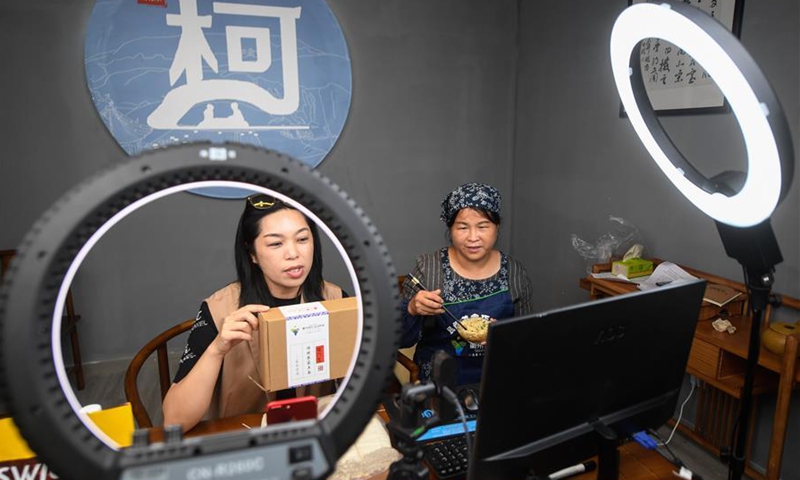Alibaba investors reportedly swap ADRs for HK stock amid US regulatory tightening
By Li Qiaoyi Source: Global Times Published: 2020/8/24 22:58:41
Alibaba investors reportedly swap ADRs for HK stock

Villager Wang Huilan (R) presents handmade noodles to be sold during a live video stream in Wantian Township in Quzhou City, east China's Zhejiang Province, July 18, 2020. More than 1,000 local villagers have learned livestreaming at the Village Livestreaming College set up in Wantian Township by China's e-commerce giant Alibaba since its founding in April this year. (Xinhua/Huang Zongzhi)
Multiple major shareholders of Alibaba have reportedly swapped the e-commerce giant's US-listed shares for Hong Kong stock to shield their holdings from potential sanctions targeting US-traded Chinese technology firms.
Such conversions also attest to the allure of promising Chinese firms for global investors, market observers said, predicting that more US-listed Chinese firms would follow suit and move their listings as part of a trend to hedge against US regulatory toughening.
Temasek Group Holdings, Baillie Gifford & Co, and Matthews Asia are among the top Alibaba investors that have converted billions of dollars in the e-commerce behemoth's American depositary receipts (ADRs) for Hong Kong stock, Bloomberg reported on Monday, citing unidentified people familiar with the moves intended to avoid the impact of delistings of Chinese technology majors.
Alibaba didn't respond to a request for comment as of press time.
Chinese firms are mainly listed on the NASDAQ and NYSE through ADRs. That institutional investors are swapping their ADRs for Hong Kong shares is a precaution against the US' tougher stance on listings from developing economies, especially China, Wu Jinduo, head of fixed income at the research institute of Great Wall Securities, told the Global Times on Monday.
The conversion of ADRs into Hong Kong stock or A shares suggests that global investors remain bullish about investing in promising Chinese listed firms and holding Chinese assets, Wu reckoned, noting that the regulatory crackdown that has caught US-listed Chinese companies off guard is also detrimental to the interests of global investors.
Sun Lijian, director of the Financial Research Center at Fudan University, expected more such cases of ADR conversion to occur among US-traded Chinese firms as part of a general homecoming trend.
The US is taking advantage of the dollar's hegemony to exercise its long-arm jurisdiction and force investors to take sides. However, investors keen to tap into China's growth would still be committed to "premium China-based investment options," Sun told the Global Times on Monday.
Still, it's not the case that the US aims to delist all Chinese firms from American exchanges or prevent all Chinese listings, Great Wall Securities' Wu remarked, citing Chinese online property platform Beike's recent debut on the NYSE and the US IPO plans of Chinese Tesla competitor Xpeng Motors and Chinese fintech giant Lufax.
The amount of money Chinese listings raised in the first half was well above the year-earlier level, according to Wu, and a majority of the new Chinese share offerings were privately owned businesses, so it's unjustified to attribute delisting risks to fraying China-US relations.
Newspaper headline: Alibaba investors reportedly swap ADRs for HK stock